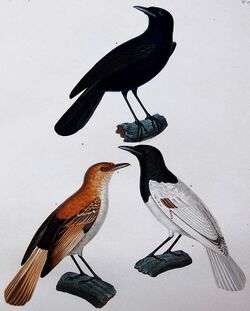Biology:Maupiti monarch
| Maupiti monarch | |
|---|---|
| Scientific classification | |
| Domain: | Eukaryota |
| Kingdom: | Animalia |
| Phylum: | Chordata |
| Class: | Aves |
| Order: | Passeriformes |
| Family: | Monarchidae |
| Genus: | Pomarea |
| Species: | P. maupitiensis
|
| Binomial name | |
| Pomarea maupitiensis (Garnot, 1829)
| |
The Maupiti monarch (Pomarea maupitiensis) was a species of bird in the family Monarchidae. It was endemic to the island of Maupiti in the Society Islands (French Polynesia). The Maupiti monarch became extinct shortly after the type specimen was collected in 1823[1] by the French Navy officer Jules de Blosseville. At the time of its collection, it was unknown to zoologists.[2]
Taxonomy and systematics
The Tahiti monarch was originally described in the genus Muscicapa. The Maupiti monarch was formerly considered conspecific with the Tahiti monarch until the species was split in 2012.[3] The Maupiti monarch was formerly referred to by the scientific name Pomarea pomarea (Lesson & Garnot, 1828), but that name turns out to be a junior synonym of P. nigra (Sparrman, 1785), necessitating changing the Maupiti monarch's scientific name to P. maupitiensis (Garnot, 1829).[4]
Notes
- ↑ "Maupiti Monarch (Pomarea pomarea) - BirdLife species factsheet". https://datazone.birdlife.org/species/factsheet/maupiti-monarch-pomarea-pomarea.
- ↑ Lee 2018, p. 345.
- ↑ "IOC World Bird List". doi:10.14344/IOC.ML.3.1. https://www.worldbirdnames.org/ioc-lists/crossref/.
- ↑ Dickinson, Edward C.; Lee, Michael; Cibois, Alice; Boussès, Patrick; Fuchs, Jérôme (2019). "Clarifying the nomenclature of Pomarea species (Monarchidae) from the Society Islands". Bulletin of the British Ornithologists' Club 139 (1): 65–74. doi:10.25226/bboc.v139i1.2019.a5. ISSN 0007-1595.
References
- Lee, Michael (2018). Navigators & Naturalists: French Exploration of New Zealand and the South Seas (1769–1824). Auckland, New Zealand: David Bateman. ISBN 978-1-86953-965-8.
Wikidata ☰ Q1439640 entry
 |



